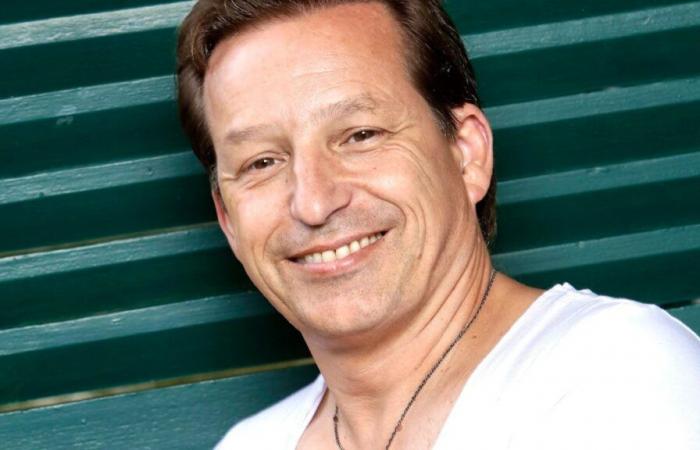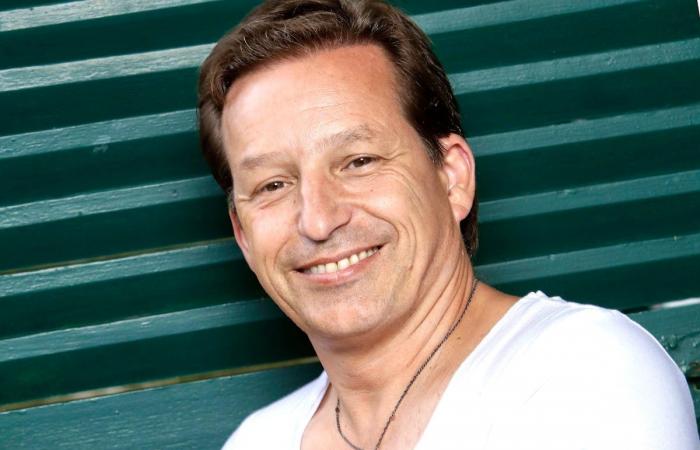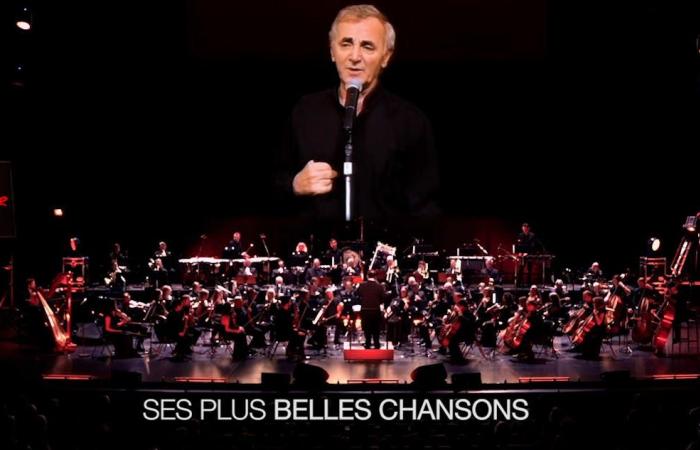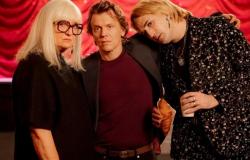Mischa Aznavour is the son of Charles Aznavour and Ulla Thorsell, the singer’s third and last wife.
Corbis via Getty Images
Charles Aznavour would have celebrated his 100th birthday in 2024, but his legacy has not aged a bit. Thanks to the passion of his children, the memory of the artist continues to vibrate on stage and on screen. We spoke this week with Mischa Aznavour, one of the sons of the legend. He tells us that he liked the film “Monsieur Aznavour”, especially the lively interpretation of Tahar Rahim. With enthusiasm, the 53-year-old Genevan novelist evokes “Aznavour Célébration”, a film concert mixing images and music, currently on tour.
This unique show, which will stop at the Geneva Arena on December 11, is a true declaration of artistic love. “My brother Nicolas is immersed in a philharmonic project, so I imagined something around Aznavour’s films. No question of stepping on his flowerbeds,” says Mischa Aznavour, accomplice and perfectionist. One thing is certain, the emotion will be there, carried by the eternal voice of Charles and the creative gaze of his son.
What can you expect from the “Aznavour Célébration” film concert?
I wanted to organize a little concert around cinema. There are already many concerts dedicated to Charles Aznavour, with performers covering his songs, but, in my opinion, people prefer to hear Aznavour singing Aznavour. Unless the covers are truly exceptional or if they are limited to one or two well-chosen titles, as we do.
Yes, in particular Alain Chamfort who will cover “Sa Jeunesse”, Antoine Delie will perform “Comme Ils Say” and La Rue Kétanou will play “Les Deux Guitares”. There might be another surprise… That said, I always find it more interesting to see Aznavour singing his own songs.
Concretely, how does this happen?
When you arrive, you discover 80 musicians on stage. A very large screen dominates the space, and the orchestra plays with a click-sync system. For the song sequences – because there are a few songs only sung – we isolated the vocals from the original albums, while the orchestra plays live. On the screen, it’s as if Aznavour was singing in person. The most complex part was ensuring perfect synchronization, to avoid any delay between the lip movements and the music.
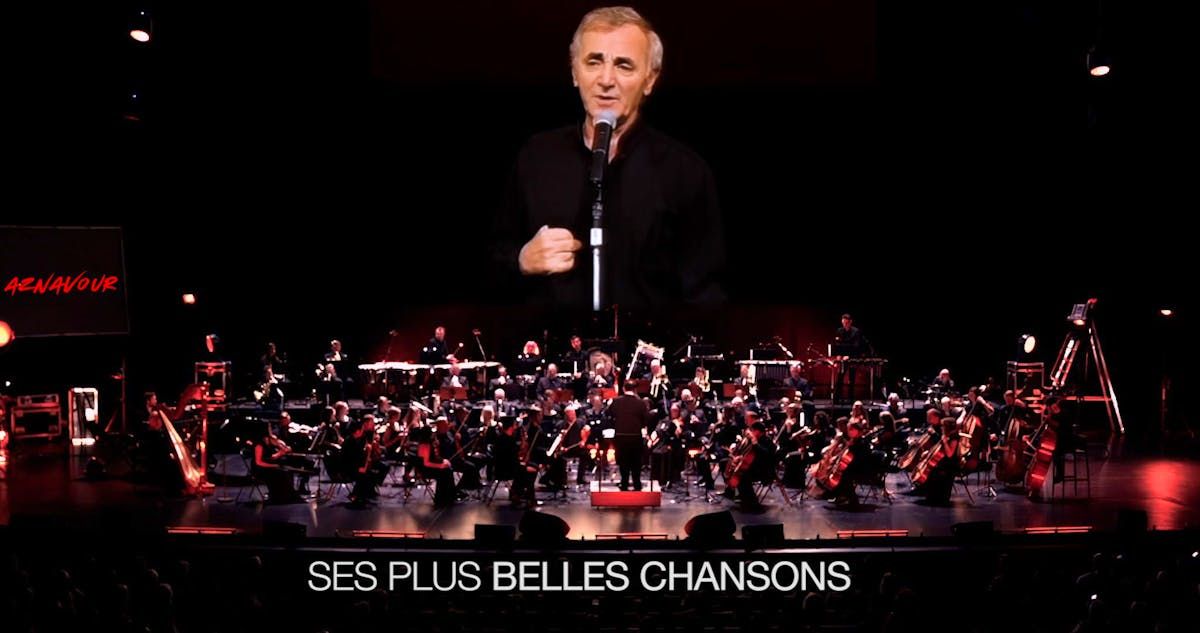
You are the artistic director of this show. How did you participate in the project?
I wrote a short connecting text, personal and poetic, around my father. These are moving sentences that describe my relationship with my father or the one he had with life. Then we had to choose the songs and the guests. This work was shared with Thierry Chabroux and Alexandre Piot, the producers. However, for about half of the tracks, it was me who decided which pieces I wanted to see performed.
Was it easy to write his words about your father?
I have a lot of ease. I do everything at the last minute. I had to start writing this text a month before the deadline. (Laughs.)
Did you find inspiration easily?
My father often said, “I don’t believe in inspiration, I only believe in perspiration.” But for me, it’s quite the opposite: I only know inspiration, not perspiration. (Laughs.) That said, writing about my father is not difficult. I’ve always been writing poetry, so all it takes is one click to plunge me into a state of inspiration. He’s my dad, so I just spoke from my heart.
Do you have any fears about this project?
I didn’t want to do too much, or give the impression of putting myself forward under the pretext of talking about my father, as if I was trying to show what I can do. That wasn’t my intention at all. At the end, there is a pretty nice little clip, with images of me as a child filmed by my father, accompanied by music that I chose. I was afraid it would seem pretentious, but my niece, who is very demanding, reassured me: she found it super cute and touching. I told myself that, ultimately, I was the best person to talk about my father, as long as it remained sincere and humble, without trying to “show off” at his expense.
Since the beginning of our meeting, you have shown humility by often speaking about others. Did your father pass this quality on to you?
Are there other values that you share with Charles Aznavour?
The values that I inherited from my father are numerous, such as honesty and kindness. Well, that said, if I share them fully, there is one that I don’t really practice. My father was a huge worker. He started at 9 years old. He always said that nothing could stand up to 24 hours of work, that you could overcome anything with enough effort. I agree with him in theory, but in practice, it’s not really my approach.
How does it feel to present your show in Geneva, where your father lived?
It’s great. He was in Geneva until the end. He was obviously going to the south of France too. He was domiciled in Switzerland and spent most of his time there. In general, he stayed around two weeks in Switzerland, then a week or two in Mouriès, before leaving on tour. But overall, he spent the most time in Switzerland.
And you, why did you decide to stay in Switzerland?
I decided to move here because my parents already lived there, and I admit, there was also a tax reason. My parents chose to come to Switzerland (editor’s note: in the early 1970s) to protect what they had built and pass on a legacy to us. I didn’t want half of their effort to be taken away from me. That was my initial motivation when I came back in 2014.
“My father said that Geneva was a tender city”
Are you delighted with this choice?
Ultimately, I’m happy here. In addition, I found my high school friends with whom I have always stayed in touch. Geneva is an incredible city, unique in the world. It is a city that is both provincial and international. We have the impression of living in Aix-en-Provence: everyone knows everyone, everyone talks about everyone, which can be annoying. But at the same time, we meet the whole Earth there, and life is simple there.
What did your father say about Geneva?
That it was a tender city. It took me a while to understand what he meant. But now I feel it. Here, people are not aggressive, we feel good. Everything is easy, even the administrative procedures: two appointments, and everything is settled. It’s a real pleasure to live in such a place.
What is the first feeling that comes to mind when you think of your father?
Pride. I’m very proud of my father, in general. I still can’t believe what he accomplished after his troubles with the French tax authorities, who, moreover, granted him a dismissal of the case but never reimbursed him his money. Taxes seized his houses, all his property. They took everything from him! He returned to Switzerland with his wife and children, without even having the means to buy a house. Of course, he continued to work, so he was able to rebuild his life. But what I admire most about him is his strength as a builder. He has incredible resilience and strength. At 56, anyone else would have been devastated by this situation. He could have said to himself: “It’s over, they are too angry with me, I was called ugly and bad, I was taken down after reaching the top.” On the contrary, he started from scratch and rebuilt an empire in Switzerland.
You said you were the child most like your father. For what?
I think I’m the one who’s the most crazy, a bit like him, the most free. But thinking about it now, I don’t completely agree with what I said. In reality, we all have a little bit of him in us. Perhaps what brings me closest to him is my way of always wanting to move, of never standing still, a bit like someone jumping from one train to another. My brother is also a lot like him, he’s super fierce, and my sister too, she has her own character traits that come from him. In fact, we all took a little from him, but what is certain is that I look more like my grandfather, my father’s father (editor’s note: see below). And I think that’s what my father liked about me: through me, he found a little of the spirit of his own father.
Besides, like your grandfather, you have several restaurants.
I still have a restaurant in Geneva. It’s called Tell Me About Salads. Before that, I launched a gourmet hot dog concept, which worked well for a while, it was always full. But I was a very bad manager. My parents, who are used to me starting projects only to abandon them, advised me to give up. Today, I am very happy: my restaurant is doing very well.
Do you want to continue to develop in the restaurant business?
We are in the process of launching crowdfunding to develop several restaurants. Tell me about salads across Geneva and Switzerland. Furthermore, I have another longer-term project: organizing concerts in small theaters, with two pianos. It would be a bit the same principle as what I’m doing now, that is to say removing my father’s voice from the original recordings and proposing new arrangements on the piano. The idea would be to play in more intimate rooms. My father dreamed of performing in small theaters, like those of the 19th century found in France, for example in Tarascon. Even if he preferred to perform with at least a small orchestra, I have no doubt he would have loved the idea.
Leave a message to Charles Aznavour
Mischa Aznavour: “If people wish to leave a message in the guestbook dedicated to Charles Aznavour to show him their love, they can go to the site aznavourpourlamour.com. They will also discover everything about our association, as well as the actions carried out in its name.”
“Every year, I defend the Aznavour Prize for words of love, a literary prize which is now celebrating its third edition. This year, the winner is Léonor de Récondo for her work “Le Grand Feu”. Visitors can, if they wish, make a small donation to support this prize and our initiatives.”

